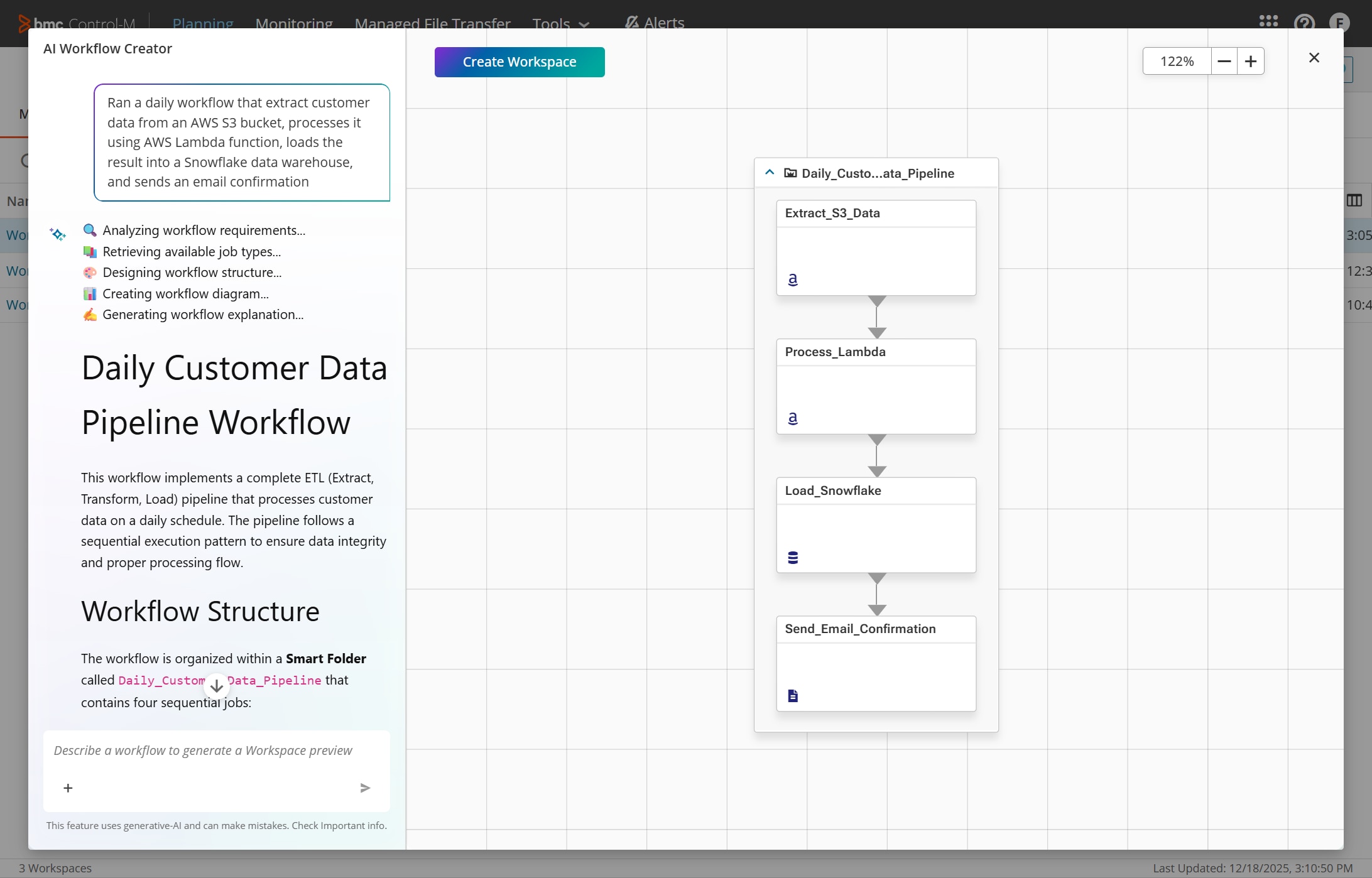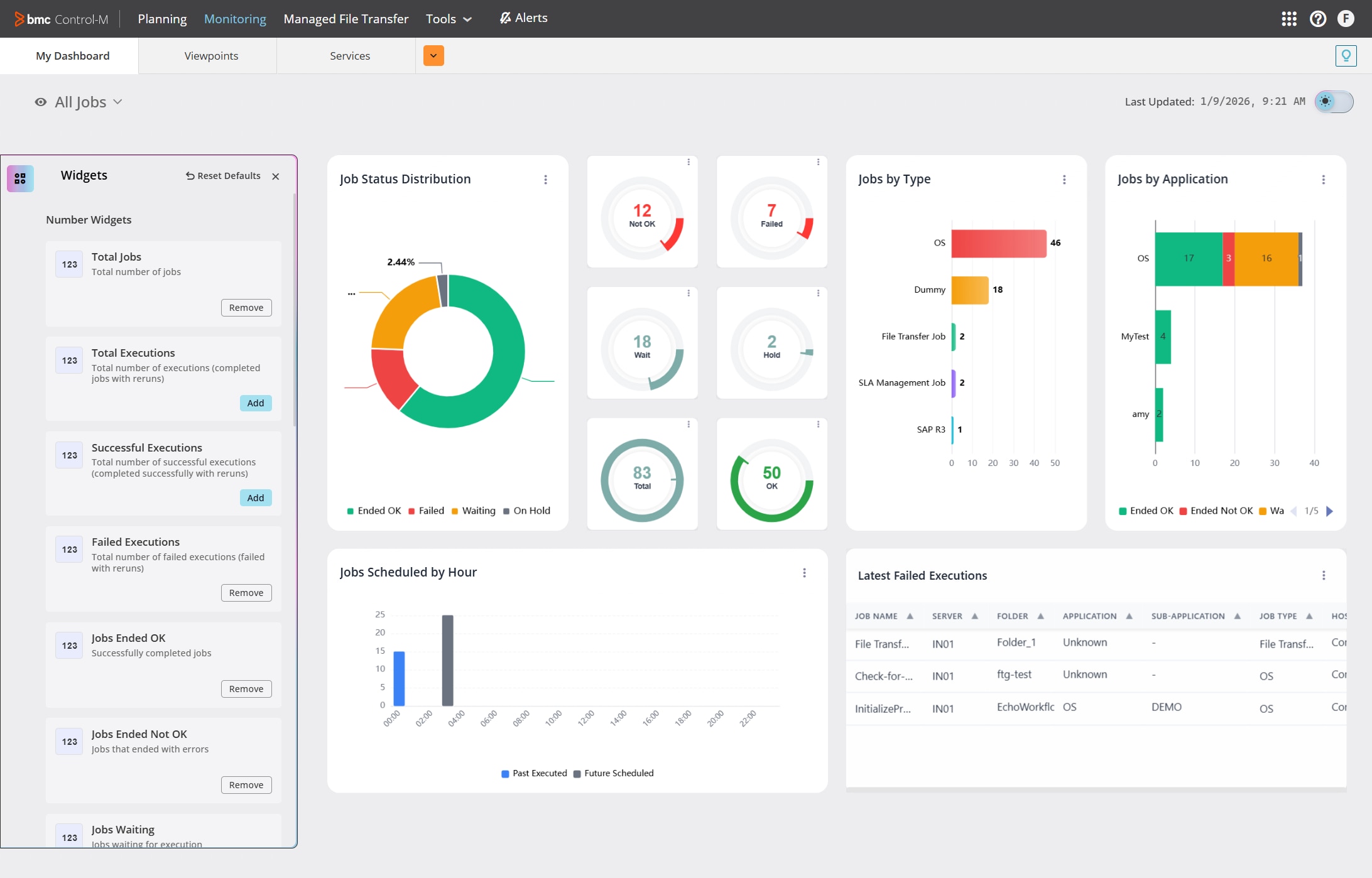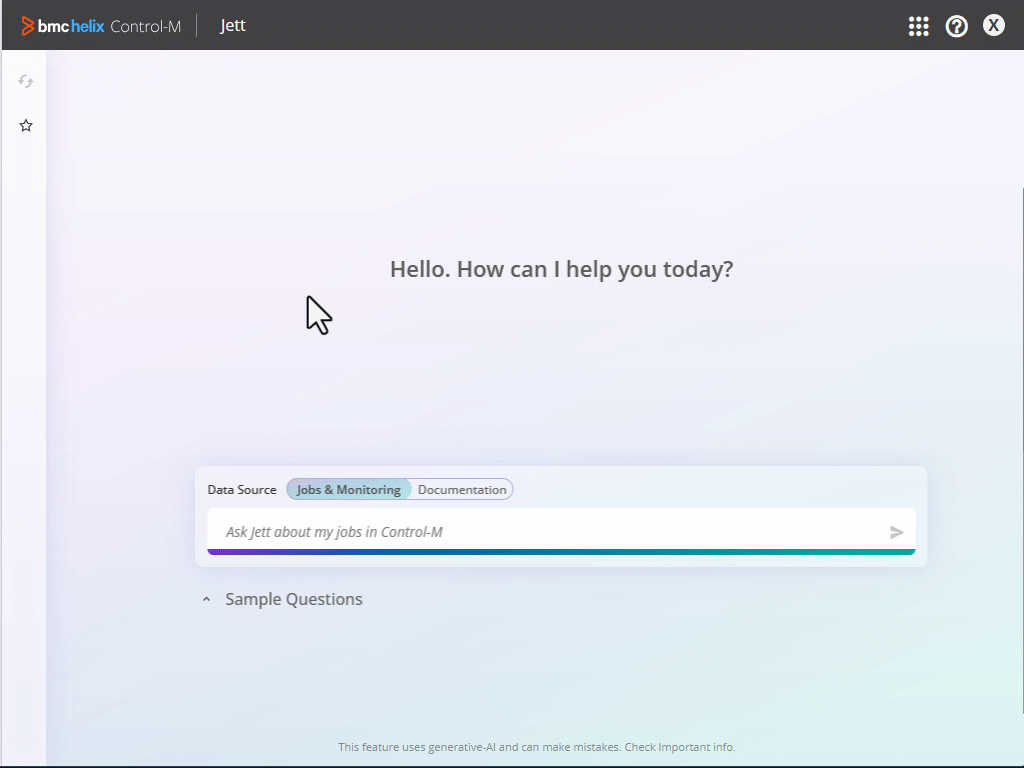Let us know how we can help
Sales & Pricing
Speak to a rep about your business needs
Help & Support
See our product support options
General inquiries and locations
Contact usUnlock the extraordinary potential of your orchestration framework to connect people, applications, and data to the business outcomes that matter most.

Define Workflows Effortlessly with AI Workflow Creator
More accessible, faster, and more intelligent workflow creation powered by AI
-
DEMOCRATIZE WORKFLOW CREATION
AI guidance lowers skill barrier and opens workflow creation to more practitioners
-
ACCELERATE BUSINESS OUTCOMES
AI Workflow Creator drafts workflows instantly, eliminating documentation searches and speeding delivery for experts and non-experts alike
-
INTELLIGENT, INTENT-DRIVEN DESIGN
Users describe their intent in natural language; AI Workflow Creator interprets it, proposes the full workflow structure, suggests job types and dependencies, and guides them through completion
Enhance Real-time Orchestration with Control-M for Event-Driven Workflows
Integrating events into agile, adaptive workflows across the enterprise
-
SYNC WORKFLOWS TO EVENTS
Listen, react, and adapt – orchestrating workflows around ecosystem events
-
INTEGRATE POPULAR PLATFORMS
Connect with widely adopted event and message systems such as Kafka, AWS SQS, RabbitMQ, and Azure Service Bus.
-
ENABLE DYNAMIC CHANGES
Dynamically build or adapt workflows to changing conditions using message body information.

Simplify Workflow Monitoring with the New Dashboard
Smart, dynamic, and actionable monitoring across the organization.
-
EXPAND ACCESS ACROSS TEAMS
Enable more teams to easily monitor their workflows, increasing engagement and operational reach
-
CUSTOMIZE MONITORING
Tailor dashboards through flexible add/remove/resize tiles so each team sees exactly what matters to them.
-
SURFACE CRITICAL ISSUES INSTANTLY
Surface failures, waits, and bottlenecks at a glance, with immediate drill-down for rapid analysis, faster issue resolution and optimization
Ensure Trusted Outcomes with Control-M Data Assurance
Control-M Data Assurance strengthens workflow orchestration with built-in data validation
-
ENHANCE DATA OBSERVABILITY
Embed data checks directly into Control-M workflows to continuously monitor, detect, and prevent bad data from spreading
-
AUTOMATE RECOVERY ACTIONS
Trigger stop, alert, and recovery workflows automatically when data issues are detected
-
DELIVER TRUSTED OUTCOMES
Ensure timely and trustable outcomes that build confidence in your processes and decisions

Simplify and Speed Operations with Jett
Empower teams with GenAI-driven automation that works right out of the box
-
INSTANT EXPERTISE AT YOUR FINGERTIPS
Jett, the GenAI-powered advisor for Control-M SaaS, answers your workflow-related questions in simple, natural language and provides intelligent documentation assistance
-
SIMPLE LANGUAGE ANSWERS FOR ALL SKILL LEVELS
It benefits users from IT Ops to business, beginners to experts, with answers anyone can understand
-
DRAMATIC ACCELERATION OF KEY SCENARIOS
It enables faster issue resolution, easier audit verification, and optimization, while you learn as you work with instant, precise answers to your product questions
Integrate Data Everywhere
Deliver monthly integrations to connect your data and cloud ecosystems for seamless, real-time insights
-
ORCHESTRATE ACROSS CLOUD MODELS
Keep Control-M the single orchestration hub across all major public clouds, continuously adding new integrations
-
ORCHESTRATE AI & ML PIPELINES
Streamline AI and ML workflows — from data extraction and staging to transformation, training, evaluation, and visualization — for seamless production delivery at scale
-
ORCHESTRATE APPLICATIONS AND DATA
Continue to bridge ERP/CRM and MFT workflows within data pipelines, turning AI predictions into real-time actions
Scale Extraordinary Results
Adapt and scale orchestration across the hybrid/multi-cloud enterprise
-
ENHANCED, SEAMLESS TRANSITION
Transition to SaaS at your pace, with the flexibility to stay hybrid
-
ADAPTABLE DEPLOYMENT AND SCALABILITY FOCUS
Enhance deployment on cloud & hybrid, and improve scalability
-
KEY INTEGRATIONS FOR EXTRAORDINARY RESULTS
Strengthen Control-M capabilities by integrating with your specialized tools such as, CyberArk for security, and Datadog, AppDynamics, and Dynatrace for APM
Collaborate with Agility
Enable faster collaboration with a unified orchestration framework
-
Access new capabilities with web UI
Advancing with web UI capabilities and a modern edge
-
Extraordinary web experience
Structured, thoughtful, customer-driven design
-
Unified View enhancements
Expand Unified View adoption for seamless control across self-hosted and SaaS environments
Solutions that fit your scale.
- SaaS deployment
- Available on AWS marketplace
- Full cloud and hybrid application and data orchestration (AWS, Azure, GCP, Snowflake, Databricks)
- SLA management and GenAI advisor service
- GitOps/DevOps CI/CD Integration
- 24x7 support
- Automatic upgrades and new feature access
- Includes high availability and disaster recovery out of the box
- SaaS, self-hosted, or hybrid deployment
- End-to-end visualization from mainframe to hybrid and multi-cloud
- Customizable usage models and contract options
- Industry-leading enterprise-class orchestration platform
- Available on AWS and Google Cloud Platform marketplaces
- Follow the sun global support, dedicated Customer Success Manager available
- Professional conversion services available
Resources
Demo
Data Assurance
Discover how Control-M's Data Assurance can seamlessly integrate data quality checkpoints into your pipelines, catching error before they impact your business.
